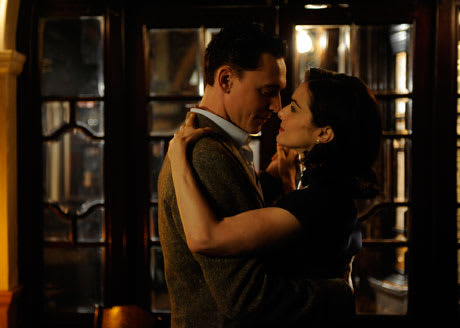Partway through Terence Davies' latest period piece about a martyred woman attempting, or committing, suicide (House of Mirth being the other), respected British Judge William Collyer (Simon Russell Beale) suggests to his wife, Hester Collyer (Rachel Weisz), that her leaving him for penniless Air Force pilot Freddie Page (Tom Hiddleston) is tragic.
With a slightly patronizing smirk, she replies, "Well, you can call it sad, but I'm not sure it's quite tragic," which ostensibly sums up this simultaneously simplified and expanded cinematic rendition of the Terence Rattigan play, The Deep Blue Sea, a film that never musters up the emotional resonance for which is strives.
Shot almost entirely with soft focus imagery, lingering on the many pained expressions of the despondent and highly emotional Hester Collyer, Davies' adaptation removes much of the secondary storylines from the film to focus specifically on the nature of indulging in passion without restraint. It flips back and forth through time somewhat, revealing key moments in her relationships leading up to her attempted suicide.
Amidst the clever banter and thematically resonant conversations, we learn of Hester's rationale for risking a comfortable, upper-class life for something crudely dismissed as hormonal impulse.
Weisz takes advantage of her character's manic disposition, beaming with energy when her relationship with Freddie is on a high, simultaneously retreating into an inner-world of self-loathing when things prove less than perfect. She even manages to balance a scene of emotional abuse, where she plays fragile and desperate while being berated in an effort to quietly get her own way.
And while her performance shows detailed analysis and complexity, ranging across the spectrum of human emotion, the actual film falls flat, never conjuring the dramatic heft the melodramatic score suggests should be there.
As much as characters scream and cry, Davies's cold, formal approach to the material is far too distancing to resonate and too unspecified to force analysis.
(Film 4)With a slightly patronizing smirk, she replies, "Well, you can call it sad, but I'm not sure it's quite tragic," which ostensibly sums up this simultaneously simplified and expanded cinematic rendition of the Terence Rattigan play, The Deep Blue Sea, a film that never musters up the emotional resonance for which is strives.
Shot almost entirely with soft focus imagery, lingering on the many pained expressions of the despondent and highly emotional Hester Collyer, Davies' adaptation removes much of the secondary storylines from the film to focus specifically on the nature of indulging in passion without restraint. It flips back and forth through time somewhat, revealing key moments in her relationships leading up to her attempted suicide.
Amidst the clever banter and thematically resonant conversations, we learn of Hester's rationale for risking a comfortable, upper-class life for something crudely dismissed as hormonal impulse.
Weisz takes advantage of her character's manic disposition, beaming with energy when her relationship with Freddie is on a high, simultaneously retreating into an inner-world of self-loathing when things prove less than perfect. She even manages to balance a scene of emotional abuse, where she plays fragile and desperate while being berated in an effort to quietly get her own way.
And while her performance shows detailed analysis and complexity, ranging across the spectrum of human emotion, the actual film falls flat, never conjuring the dramatic heft the melodramatic score suggests should be there.
As much as characters scream and cry, Davies's cold, formal approach to the material is far too distancing to resonate and too unspecified to force analysis.
